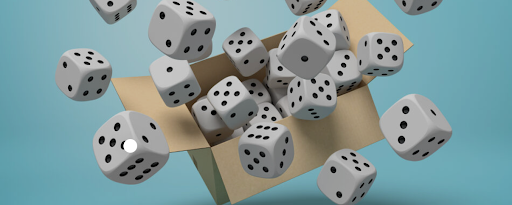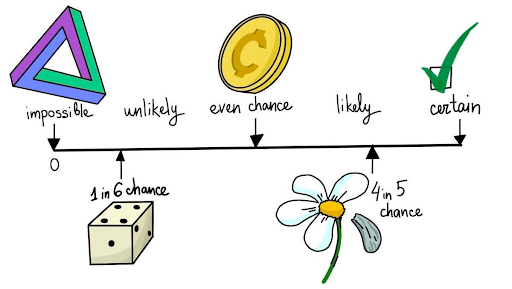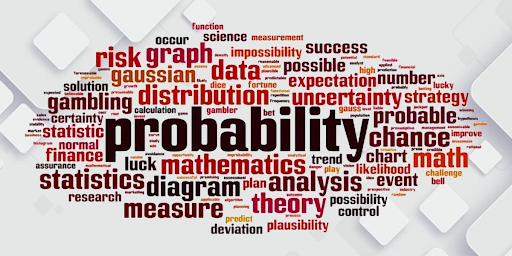
Probability theory is a math area that tells us how likely things are to happen. It helps us understand and measure chances when we're not sure about what will happen next. This is useful for making daily decisions and solving problems in fields like business, engineering, and health.
It also helps people working with data, like in statistics or data science, to make smart decisions based on the information they have. In short, learning about probability helps us deal with uncertainty and make better choices in life.
Understanding Probability Basics
Understanding probability is like guessing how likely something is to happen. It's about figuring out all the possible outcomes of something and what might actually happen. Like if you're rolling a dice, the sample space is all the numbers you could roll, and events are the specific numbers you're hoping for.
When we talk about probabilities, we're basically trying to find out how likely things are to happen. We use numbers between 0 and 1 to show this. If something has a probability of 0, it means it won't happen at all. If it's 1, it means it's definitely going to happen. Once you understand these basics, you can use probability to make sense of many everyday situations.
Probability in Simple Events
Understanding probability starts with simple events, like flipping a coin or rolling a dice. These basic examples help us grasp how probability works in everyday situations. For example, when we flip a fair coin, there's an equal chance of getting heads or tails – it's like 50-50. And with a standard six-sided dice, each number has the same chance of showing up when we roll it – about 1 in 6.
These basic examples show that probability is about figuring out how likely something is to happen. By learning about probability in simple events, we build a strong foundation for dealing with more complicated situations and making smart choices in real life.
Conditional Probability
Conditional probability is a basic idea in probability theory that talks about how likely it is for one event to happen if another event has already happened. It's like saying, "What's the chance of event A happening if event B has already occurred?" We write this as P(A|B). This concept is really helpful in everyday situations, like predicting the weather. For example, let's say we want to figure out the chance of rain tomorrow when it's cloudy today. Here, the chance of rain tomorrow depends on whether it's cloudy today.
Knowing how likely something is to happen is super important, especially for things like sports games, TV game shows, or elections. It helps us make good choices. Let's take sports betting for example. We look at how teams have done in the past, how skilled their players are, and how they've been doing lately to try to guess who might win.
Probability in Real-Life Scenarios
Probability theory helps us understand and deal with uncertainties in real life. We use it to make smart choices in different situations. For instance, when predicting the weather, scientists use probability to guess how likely it is to rain or snow. In sports, coaches use probability to figure out their team's chances of winning based on things like player injuries and past performances.
In finance, investors use probability to decide where to put their money and manage risks. And in healthcare, doctors use it to plan treatments by looking at the chances of different outcomes for patients. Probability theory is like a helpful tool that lets us make better decisions and understand the world around us more clearly.
Application of probability theory in everyday situations
Understanding probability is important in many everyday situations. For example, in weather prediction, scientists use probability to guess what the weather might be like. They look at past weather patterns and current conditions to figure out the chances of things like rain or sunshine happening. Similarly, in sports, people use probability to guess which team might win a game. It helps them make educated guesses based on factors like the teams' past performances and current strengths.
Factors such as team performance, player statistics, and game conditions are considered to calculate probabilities and make informed predictions. In stock market analysis, probability theory is applied to assess the potential risks and returns associated with different investment decisions, including those involving live casino online
platforms. Investors use probabilistic models to estimate the likelihood of price movements and identify profit opportunities.
Overall, the application of probability theory in everyday situations provides valuable insights and tools for decision-making in uncertain and dynamic environments.
How probability helps in decision-making and risk assessment
Probability helps us make decisions and understand risks in areas like money matters and health. It tells us how likely things are to happen, helping us choose wisely.
For instance, in money matters, people look at the odds to decide where to invest. In health, it helps medical staff predict how well a treatment might work.
Knowing probabilities lets us consider the pros and cons in different situations. It's useful when trying something new and wanting to know if it will likely succeed. Probability also helps in assessing risks, like when companies want to know if a project will work out or if new tech is safe.
In short, understanding probability makes us better at planning and making choices in various aspects of life.
Advanced Probability Concepts
Advanced probability concepts help us understand chance better. Permutations deal with arranging items in order, like letters or people. Combinations involve choosing items from a group without caring about order, like picking committee members. These ideas help us in real life, like calculating game outcomes or chances of events.
For example, permutations can tell us how many passwords are possible, and combinations can show us our lottery winning chances or chances in a card game. Learning these concepts helps us grasp and make better decisions in complex situations involving chance.
Probability Distributions
Probability distributions tell us how likely something is to happen. For example, they help us understand the chance of getting heads when we flip a coin many times. A common kind, the normal distribution, shows how data is usually spread out and is used in many areas like money and science.
Understanding these distributions is useful for analyzing information and making informed decisions. Each distribution has its own unique characteristics that explain its shape and behavior. By learning about them, we can better predict and comprehend real-life events based on probabilities.
Probability in Live Events
Understanding how likely things are to happen is really important, especially for live events like sports games, TV game shows, or elections. It helps us make smart choices. For example, in sports betting, we look at how teams have played before, how good their players are, and how they've been doing recently to guess who might win.
In game shows like "Wheel of Fortune" or "Jeopardy," we also use these chances to figure out who will win by watching how the players do and knowing the rules of the game. And when it comes to elections, we look at polls, how people are voting, and other important things to guess who might win.
Using this idea of chances with live events helps us make better guesses, whether we're betting on a sport, making plans, or trying to guess who will win an election.
Challenges and Limitations of Probability Theory
Understanding probability is helpful but can be hard. Sometimes, the ways we try to understand probability are too simple and don't match real life well. It can also be tricky to figure out what the results of probability mean, especially when there are lots of different possible outcomes.
One problem is that we often don't know everything we need to, or things are just naturally unpredictable. This can be because we're missing information or because some things are just random. To deal with these problems, we might use special methods like Bayesian inference or Monte Carlo simulation to better manage the uncertainty and changes that happen in real life.
Even though it has its difficulties, probability is still very useful for making decisions and understanding many things in life. It's just important to remember its limitations so we can use it in the best way possible.
Future Directions and Applications
In the future, probability theory will be even more important and useful in many areas. One cool thing happening is that it's being used with smart computer programs (like AI and machine learning). This helps these programs make better guesses and choices when they don't know everything for sure.
Probability theory is like a superpower for data science and analytics. It helps us make sense of big piles of data and find important stuff inside. It's not only about numbers; it can also be handy in:
- healthcare,
- money stuff,
- and even saving the planet!
For example, in healthcare, it can help with diagnosing diseases and planning treatments. In finance, it's used to understand risks and make better investment decisions. And in environmental science, it can be used to study and predict things like climate change.
So, overall, the future looks bright for probability theory. It's going to be used in lots of different areas and will help us make better decisions and discoveries in the future.
Conclusion
This article is about probability, which helps us figure out how likely things are to happen. It talks about simple things like sample spaces and events, which are just different outcomes. We use probability every day, like guessing the weather or flipping a coin. It also talks about harder stuff like probability distributions, which help us understand different situations.
Basically, probability helps us make decisions and know how risky something might be. It's worth learning more about because it's interesting and useful. Knowing about probability can help you with money, science, and engineering. So, keep learning about it, and you'll be better at making smart choices, even when things are uncertain.





